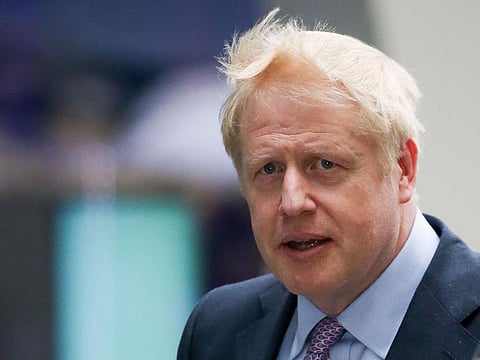Race to be British prime minister: Boris Johnson advances on top job
Former foreign secretary ahead in second ballot with 126 votes, while Raab is eliminated

London: Brexit campaigner Boris Johnson advanced on the prize of Britain’s top political job on Tuesday, winning 40 per cent of votes in the second round of a contest to replace Prime Minister Theresa May.
Johnson, the face of the official Brexit campaign in the 2016 referendum, won 126 out of 313 votes and so goes through to a third ballot between 1400 GMT and 1600 GMT on Wednesday with four other candidates who won 33 votes or more.
Foreign Secretary Jeremy Hunt won 46 votes, Environment Secretary Michael Gove won 41, International Development Secretary Rory Stewart 37 and Home Secretary Sajid Javid 33.
While Johnson won by far the most votes, he added just 12 from the first round. Stewart, 46, was the biggest gainer from the first round, adding 18 votes.
Dominic Raab, a former Brexit minister, was eliminated from the contest as he won just 30 votes today — the lowest among the six Tory contenders.
Johnson, a former London mayor and foreign minister, says he will take Britain out of the European Union by October 31 whether or not there is a deal with Brussels to smooth the transition, potentially setting up a fight with parliament.
In the first round last Thursday, Johnson won 114 out of 313. The candidates who survived the second round of voting were due to participate in a televised debate later tonight.
Once the list is whittled down to two candidates, a postal ballot of the wider Conservative Party membership nationwide will be held to pick a leader. A new prime minister should be chosen by the end of July.
Johnson, whose unconventional style has helped him shrug off a series of scandals in the past, has won over much of his party by arguing that only he can rescue it by delivering Brexit.
Johnson, who in the run-up to the referendum compared the goals of the EU with those of Hitler and Napoleon, has promised to cut income tax for high earners.
His rise towards Downing Street is the latest twist in an eventful career for a man whose quick wit and eccentric style have helped him shrug off a series of scandals, including getting sacked from the party’s policy team while in opposition for lying about an extra-marital affair. But where others would have floundered, Johnson became increasingly popular, culminating in his two victories in usually left-leaning London’s mayoral contests in 2008 and 2012.
After helping to win the Brexit referendum for the Leave side in 2016, Johnson’s bid to succeed David Cameron as prime minister was scuppered when his close ally Gove abruptly deserted him and announced his own candidacy.
The betrayal by Gove, whose parting shot was to say that “Boris cannot provide the leadership or build the team for the task ahead”, stopped Johnson’s march on Downing Street in 2016, allowing May to win the top job.
But May’s failure to get a Brexit divorce deal ratified by the British parliament destroyed her premiership.
“We must leave the EU on October 31st, with or without a deal, so we can begin to unite our country, restore trust in our politics, and move beyond Brexit to focus on delivering for everyone,” Johnson said on Tuesday.
Sign up for the Daily Briefing
Get the latest news and updates straight to your inbox



